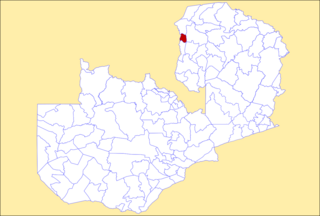 |
|---|
Mwansabombwe is a constituency of the National Assembly of Zambia. [1] It covers the towns of Kazembe and Lufubu in Mwansabombwe District of Luapula Province.
 |
|---|
Mwansabombwe is a constituency of the National Assembly of Zambia. [1] It covers the towns of Kazembe and Lufubu in Mwansabombwe District of Luapula Province.

The Luapula River is a north-flowing river of central Africa, within the Congo River watershed. It rises in the wetlands of Lake Bangweulu (Zambia), which are fed by the Chambeshi River. The Luapula flows west then north, marking the border between Zambia and the Democratic Republic of the Congo before emptying into Lake Mweru. The river gives its name to Zambia's Luapula Province.

Elections in Zambia take place within the framework of a multi-party democracy and a presidential system. The President and National Assembly are simultaneously elected for five-year terms.
Kawambwa is a town in the Zambian province of Luapula located on the edge of the northern Zambian plateau above the Luapula valley at an altitude of 1300 m. It was chosen as an administrative district of the same name by the British colonial authorities who preferred the climate of the plateau rather than the hotter valley where most of the district's population live, and it continues as an administrative district today.

Luapula Province is one of Zambia's ten provinces located in the northern part of the country. Luapula Province is named after the Luapula River and its capital is Mansa. As per the 2022 Zambian census, the Province had a population of 1,519,478, which accounted for 7.72 per cent of the total Zambian population.

The National Assembly is Zambia's unicameral legislative body. Between 1972 and 1990, Zambia was a one-party state with the United National Independence Party (UNIP) as the sole legal party.

Kazembe is a traditional kingdom in modern-day Zambia, and southeastern Congo. For more than 250 years, Kazembe has been an influential kingdom of the Kiluba-Chibemba, speaking the language of the Eastern Luba-Lunda people of south-central Africa. Its position on trade routes in a well-watered, relatively fertile and well-populated area of forestry, fishery and agricultural resources drew expeditions by traders and explorers who called it variously Kasembe, Cazembe and Casembe.

The ten provinces of Zambia are divided into a total of 116 districts as of 2018.
Kazembe is a name used for Mwata Kazembe's town in the Luapula Province of Zambia, especially on maps and in the Zambian postal service. The other name for the town is Mwansabombwe and this is the one used by its or Luba or Chibemba-speaking inhabitants. They may refer in English to "Kazembe's Village" or just "Kazembe", as traditionally a settlement is named after the chief or headman, rather than the location. The Luba-Lunda shared with many tribes the custom of moving to another village or a new site on the death of the chief. Historical references to a village or town may actually be to a different location. For instance when the explorer David Livingstone visited Mwata Kazembe in 1867 and 1868, "Casembe's town", as he wrote it, was further north at the town now called Kanyembo.
Mbereshi is a village in the Luapula Province of Zambia, named after the Mbereshi River on its north side. It is the site of a large mission founded in 1900 by the London Missionary Society. In 1915 the mission established Mbereshi Girls' School, the first girls' school in the territory, as well as a boys' school and a large hospital. The Girls school and Hospital are now Grant Aided institutions run by The United Church of Zambia. Mbereshi contains a number of examples of mission buildings, including a large church which is now part of the United Church of Zambia.

The Speaker of the National Assembly of Zambia is a position established under Article 69(1) of the constitution. The Speaker is elected by members of the Assembly from anyone eligible to be elected to the National Assembly, but cannot be a sitting member.

Nchelenge District is a district of Zambia, located in the Luapula Province. The capital lies at Nchelenge. As of the 2000 Zambian Census, the district had a population of 111,119 people.

General elections were held in Zambia on 19 December 1968 to elect the National Assembly and President. The first post-independence polls saw incumbent Kenneth Kaunda retain his post as president, whilst his United National Independence Party, the only party to field candidates in all 105 constituencies, won 81 of the 105 seats in the National Assembly. Voter turnout was 82.5% in the parliamentary election, but 87.1% in the presidential election.

General elections were held in Zambia on 5 December 1973. They were the first elections held since the country was formally declared a one-party state in August, with the United National Independence Party (UNIP) as the only legally permitted party. UNIP leader Kenneth Kaunda was automatically elected to a third five-year term as President, and was confirmed in office via a referendum in which 88.8% of voters approved his candidacy. UNIP also won all 125 seats in the National Assembly. Voter turnout was 39% of the 1,746,107 registered voters for the presidential election, and 33% for the National Assembly election.
Kazembe is a traditional kingdom in modern-day Zambia. Kazembe may also refer to

Mwansabombwe District is a district of Luapula Province, Zambia. The seat of the district is Mwansabombwe. It was separated from Kawambwa District in 2012.

Mulobezi is a constituency of the National Assembly of Zambia. It covers Mulobezi and surrounding areas in Mulobezi District of Western Province.

Magoye is a constituency of the National Assembly of Zambia. It covers the village of Magoye and surrounding areas in Mazabuka District of Southern Province.

Mangango is a constituency of the National Assembly of Zambia. It covers part of Kaoma District in Western Province.

Luena is a constituency of the National Assembly of Zambia. It covers Limulunga District in Western Province, including the town of Limulunga.